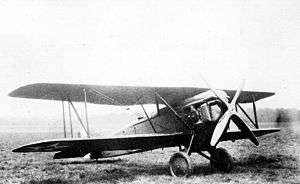Boeing XP-4
The Boeing XP-4 was a prototype United States biplane fighter of the 1920s that was grounded permanently after just 4.5 hours of flight testing.[1]
| XP-4 | |
|---|---|
 | |
| Boeing XP-4 during trials | |
| Role | fighter |
| National origin | United States |
| Manufacturer | Boeing |
| First flight | 1927[1] |
| Number built | 1 |
| Developed from | Boeing Model 15 |
Development and design
In 1926, the United States Army was very interested in the turbo-supercharger as a way of improving engine performance, and requested that one be added to the last of the PW-9s, and the engine upgraded to a 510 hp Packard 1A-1500. This machine was designated XP-4.[1]
In addition, the basic PW-9 armament of one .50 and one .30 cal. machine guns in the nose was supplemented by two added .30 cal. guns mounted under the lower wing, far enough out to be outside the propeller arc (thus not needing synchronization).[2]
All these modifications added weight, so the lower wing span was extended by 9.5 feet.
The airplane was delivered to Wright Field for testing on 27 July 1927, but it quickly became apparent that the Packard engine did not have sufficient power to compensate for the 800 lbs of extra weight, the craft performing more poorly than its predecessor, and the project was quickly abandoned.[1]
Specifications (XP-4)
Data from Fighters of the United States Air Force [3]
General characteristics
- Crew: One
- Length: 23 ft 11 in (7.29 m)
- Wingspan: 32 ft 1 in (9.78 m)
- Height: 8 ft 10 in (2.69 m)
- Wing area: 245 sq ft (22.8 m2)
- Empty weight: 2,783 lb (1,264 kg)
- Max takeoff weight: 3,650 lb (1,655 kg)
- Powerplant: 1 × Packard 1A-1500 supercharged liquid-cooled piston engine, 510 hp (380 kW)
Performance
- Maximum speed: 146 kn (168 mph, 270 km/h)
- Cruise speed: 104 kn (120 mph, 193 km/h)
- Range: 326 nmi (375 mi, 604 km)
- Service ceiling: 22,850 ft (6,965 m)
- Rate of climb: 1,400 ft/min (7.1 m/s)
Armament
- Guns: one 0.3 in and one 0.5 in machine guns firing through propellor disc plus two wing mounted 0.3 in machine guns
References
Notes
- Angelucci 1987, pp. 71–72.
- Jones 1975, pp. 20–22.
- Dorr and Bishop 1990, pp. 33–34.
Bibliography
- Angelucci, Enzo. The American Fighter from 1917 to the present. New York: Orion Books, 1987. ISBN 0-517-56588-9.
- Dorr, Robert F. and David Donald. Fighters of the United States Air Force. London: Temple, 1990. ISBN 0-600-55094-X.
- Jones, Lloyd S. U.S. Fighters: Army-Air Force 1925 to 1980s.. Fallbrook, California: Aero Publishers, Inc., 1975. ISBN 0-8168-9200-8.